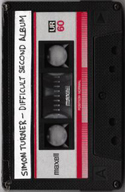It's an appropriate and witty title - with second collections, reviewers no longer have recourse to comfortable platitudes referencing the poet's potential or future prospects when the work is less than thrilling. This is crunch time. No longer must we 'watch out for' the poet; they've either steamed in or they're broken down half a mile up the track.
Lyricism is his strongest suit. Although there is the odd lapse into the already-done, in the aforementioned sequence and elsewhere Turner's ability to sustain a mood of quiet wonder is remarkable.
Or not quite. Some poets - and Turner is one of them - are still developing at this stage in their career and the lazy (but honest) reviewer just has to find a language in between the talk of fresh, young voices and 'confirmed' reputations. In Difficult Second Album, there are three flavours to Turner's writing: firstly, lyrical observation, as typified in the collection's opening lines:
A zipper of vapour
severs sky from sky,
speaking of the jet just gone ...
Secondly, there's the gently humorous vein found in his sequence of 'rejections slips', and thirdly, oft-satirical experimental pieces with shades of (to use a shorthand that's fast becoming tiresome) Oulipo; that is to say, N+7s, google poems, cut ups and variations on centos. Although Turner makes some attempts to mix or overlap his styles, they are too distinctive to blend coherently. His long and lush gathering of paeans to nature, 'Spring Notations', only falters when he drops in the kind of quirky simile that poets like Sam Riviere have made their own:
The verbascum is ready to seed, pint-sized secondary flower-spikes fanning out from its central stem, ringing the primary like footballers gathered round a goal-scoring team-mate & holding him aloft.
Lyricism is definitely his strongest suit. Although there is the odd lapse into the already-done, in the aforementioned sequence and elsewhere Turner's ability to sustain a mood of quiet wonder is remarkable. Even when his subjects have been doted on to death, he frequently comes to them with new eyes:
The adolescent magpie, awkward in his body,
perches at the beech's crest, chattering flintily,
goldfinches glimpsed as swift slashes of lemon
against the dark arabesques of the holly tree.
The humorous poems are, for the most part, rather throwaway, and while the experimental pieces are perfectly fine and often good fun, it's hard to get past the sense of them being exercises or self-administered proficiency tests. None of the forms are particularly new or boundary-pushing, as compared with the similarly inclined Matthew Welton, and they don't seem to be tied down to any sweeping vision or keen perspective, other than a welcome-but-commonplace disillusionment with the White House and political determinism.
As a final comment, there's an awful lot of musing on the nature of poetry between the collection's other moods, some of which seems oddly out-of-keeping with Turner's own approaches. It's frustrating that he can write a poem as consistently mellifluous as 'Kingfisher', but then lampshade a need for further paring down so glaringly in the fragment chosen for the back of the book:
Poetry, yes, is the moment,
& each poem should really be
as brief, as brisk & as necessary
as the shrill pip of a blackbird
jousting through the hazy air,
liquescent in its flight.
('A Letter to Charles Simic')
To be as brief, brisk and necessary, you'd surely have to lose the last two lines.

Dr F sez: Dr Fulminare, blurb inspector, at your service! First of all, my dear commissioner, why go to the trouble of such a clever, self-knowing title, just to take it back? "...this second collection is by no means difficult" indeed! What means "a linguistic landscape wholly his own" when there is so much acknowledged collaboration and connivery with the likes of O'Hara, Hughes and Edward Thomas to name a few? "Simon Turner remains confident and foot-sure ... of what poetry both intends and is capable of" - why do we want to know about 'poetry'? It's this book that matters for the moment. "... an authentic troubadour of the surreal" - fair enough, except that authenticity is a questionable quality. What's wrong with sleight of hand? Should as flighty and tricksy a writer as Turner really be lumbered with an aura of earnestness by his own introduction? "... infectious and joyously offbeat lines ... quiet riots ... mislaid manifestos" - now, that's more like it!
I believe there is a place for Simon Turner in poetry, and anyone who can epigraph a poem 'after' himself is surely destined to go far. But this collection makes me want to do some cutting up and rearranging myself. "... may veer", says the back, and veer he does, too often.










